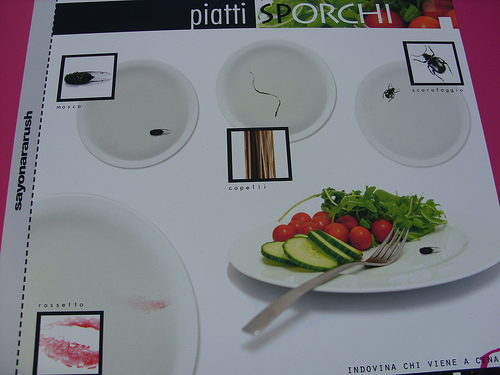Urban vegetarians in South Asia have high rates of heart disease in spite of low rates of obesity and low LDL levels. I learned about it here.
Month: May 2009
The Fantasy of Fresh
From Fresh: A Perishable History (2009) by Susanne Freidberg, p. 3:
Of all the qualities we seek in food, freshness best satisfies all these modern appetites. It offers both proof of our progress and an antidotes to the ills that progress brings.
Oops. A better title would have been Fresh: History of a Delusion.
Department of Self-Congratulation (The New Yorker)
The May 4, 2009 issue of The New Yorker contains three readers’ letters, no doubt selected from a much larger number. They begin like this:
Ian Frazier, in his hilarious sendup . . .
Jill Lepore’s richly detailed article . . .
Anthony Lane’s sensitive and nuanced review . . .
Less of a Foodie
Two weeks ago I was in New York City. I have been there many times. For the first time, I was unexcited by the prospect of eating in the city’s fascinating restaurants. I think it’s all the fermented food I eat (at least two servings per day). All of it has complex flavors; all the New York restaurant food I liked had complex flavors. I am no longer complex-flavor-deprived.
How Could They Know? The Case of Healthy Gums
During my last dental exam, a month ago, I was told my gums were in excellent shape. Clearly better than my previous visit. The obvious difference between the two visits is that I now eat lots of fermented food. At the previous visit, my gums were in better shape than a few years ago. They suddenly improved when I started drinking a few tablespoons of flaxseed oil every day. Tyler Cowen is the poster child for that effect. After a lifetime of being told to brush and floss more — which I did, and which helped a little but not a lot — it now turns out, at least for me, that the secret of healthy gums is: 1. Eat fermented foods. 2. Consume omega-3. These two guidelines are not only a lot easier than frequent brushing and flossing but have a lot of other benefits, unlike brushing and flossing.
Dentistry is ancient and there are millions of dentists, but apparently the profession has never figured this out. This isn’t surprising — how could they figure it out? — but it is an example of a general truth about how things get better. (Or why they don’t get better — if only dentists and dental-school professors are allowed to do dental research.) In The Economy of Cities, Jane Jacobs makes this point. For a long time, Jacobs says, farming was a low-yield profession. Then crop rotation schemes, tractors, cheap fertilizer, high-yield seeds, and dozens of other labor-saving yield-increasing inventions came along. Farmers didn’t invent tractors. They didn’t invent any of the improvements. They were busy farming. Just as dentists are busy doing dentistry and dental-school professors are busy studying conventional ways of improving gum health.
Jacobs also writes about the sterility of large organizations — their inability to come up with new goods and services. On the face of it, large organizations, such as large companies, are powerful. Yes, they can be efficient but they can’t be creative, due to what Jacobs calls “the infertility of captive divisions of labor.” In a large organization, you get paid for doing X. You can’t start doing X+Y, where Y is helpful to another part of the company, because you don’t get paid for doing Y. A nutrition professor might become aware of the anti-inflammatory effects of flaxseed oil but wouldn’t study its effects on gum health. That’s not what nutrition professors do. So neither dentists nor dental-school professors nor nutrition professors could discover the effects I discovered. They were trapped by organizational lines, by divisions of labor, that I was free of.
——————————————————————————————————–
Hire a San Diego orthodontist for advanced dental procedures.
Too-Effective Way to Lose Weight?
Paul Rozin, a professor of psychology at Penn, found that people are reluctant to drink from a glass that contained a plastic cockroach. What would happen if people ate from a plate with a drawing of an insect?

Piatti sporchi = dirty plates. From a 2008 food design competition in Turin. (English description here.) The plates have pictures of a fly, a hair, a beetle, and a lipstick smudge. In a mass-market version, you could have a choice of insect sizes to control the amount of repulsion.
The competition was open to anyone. Most of the 50-odd entries were from students; a few were from professionals. This entry was from Sayonara Rush Design.
Thanks to Francesca Zampollo.